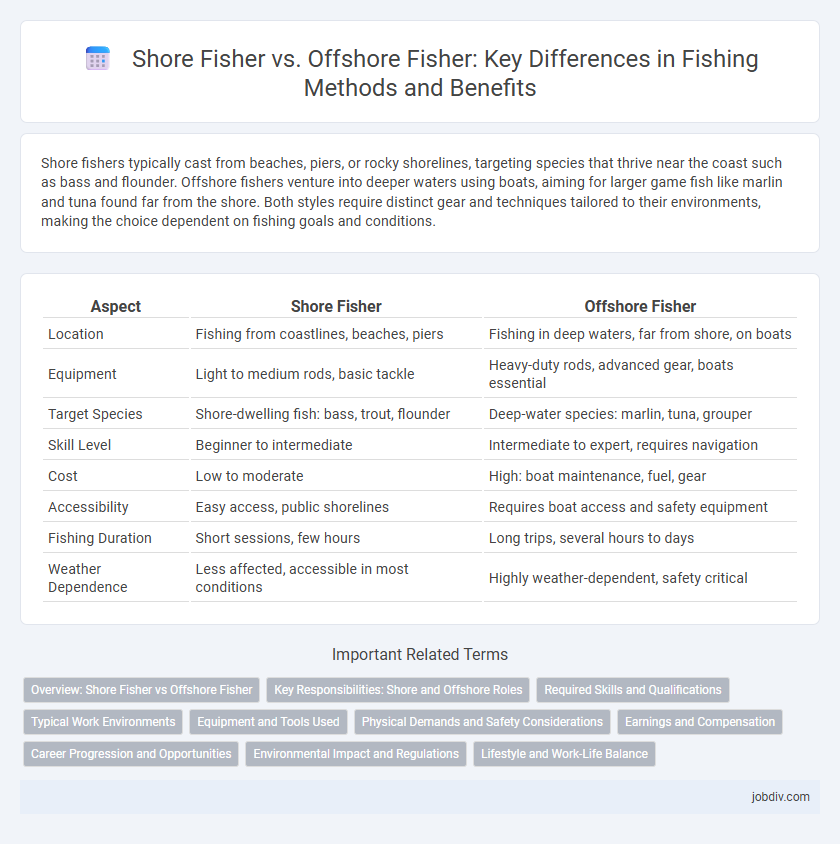Shore fishers typically cast from beaches, piers, or rocky shorelines, targeting species that thrive near the coast such as bass and flounder. Offshore fishers venture into deeper waters using boats, aiming for larger game fish like marlin and tuna found far from the shore. Both styles require distinct gear and techniques tailored to their environments, making the choice dependent on fishing goals and conditions.
Table of Comparison
| Aspect | Shore Fisher | Offshore Fisher |
|---|---|---|
| Location | Fishing from coastlines, beaches, piers | Fishing in deep waters, far from shore, on boats |
| Equipment | Light to medium rods, basic tackle | Heavy-duty rods, advanced gear, boats essential |
| Target Species | Shore-dwelling fish: bass, trout, flounder | Deep-water species: marlin, tuna, grouper |
| Skill Level | Beginner to intermediate | Intermediate to expert, requires navigation |
| Cost | Low to moderate | High: boat maintenance, fuel, gear |
| Accessibility | Easy access, public shorelines | Requires boat access and safety equipment |
| Fishing Duration | Short sessions, few hours | Long trips, several hours to days |
| Weather Dependence | Less affected, accessible in most conditions | Highly weather-dependent, safety critical |
Overview: Shore Fisher vs Offshore Fisher
Shore fishers typically cast lines from beaches, piers, or rocks, targeting species found near the coastline such as sea bass and flounder. Offshore fishers venture into deeper waters aboard boats, aiming for larger pelagic species like tuna, marlin, and swordfish using specialized gear and techniques. Differences in equipment, fish species, and fishing environments distinguish shore fishing from offshore fishing practices.
Key Responsibilities: Shore and Offshore Roles
Shore fishermen primarily focus on casting lines and nets from the shoreline, managing bait, and monitoring tide patterns to target species like bass, flounder, and trout. Offshore fishermen operate vessels, navigate deep waters, and use advanced gear such as trawls, longlines, and electronic fish finders to catch pelagic species like tuna, swordfish, and marlin. Both roles require knowledge of marine ecosystems, weather conditions, and sustainable fishing practices to ensure successful and responsible harvests.
Required Skills and Qualifications
Shore fishers require skills in casting techniques, knowledge of tides, and patience for baiting and spotting fish near the coastline. Offshore fishers need advanced navigation abilities, proficiency with marine electronics, and expertise in handling larger fishing gear in deep waters. Both require familiarity with fish species and safety protocols, but offshore fishing demands enhanced endurance and boat operation certification.
Typical Work Environments
Shore fishers typically operate from beaches, piers, and rocky coastlines, relying on accessible natural habitats and tidal patterns to catch fish. Offshore fishers work far from land on boats or ships, targeting deeper waters and larger fish species found in open seas and continental shelves. The contrasting environments influence the equipment used, fishing techniques, and species availability for both shore and offshore fishers.
Equipment and Tools Used
Shore fishers commonly use lightweight rods, spinning reels, and bait such as worms or small lures designed for casting from land, often relying on surfcasting rods for longer distance. Offshore fishers typically employ heavy-duty rods and reels equipped with electronic fish finders, outriggers, and downriggers to target larger species in deeper waters. The specialized gear used offshore includes braided lines, gaffs, and trolling motors to manage challenging sea conditions and increase catch efficiency.
Physical Demands and Safety Considerations
Shore fishing generally involves less physical strain as anglers often fish from stable ground, requiring moderate equipment and fewer safety precautions. Offshore fishing demands greater physical endurance due to exposure to rough sea conditions, handling heavy gear, and navigating larger vessels. Safety considerations are critical offshore, with mandatory life jackets, knowledge of maritime navigation, and emergency preparedness being essential to prevent accidents.
Earnings and Compensation
Shore fishers typically earn lower average incomes, ranging from $20,000 to $40,000 annually, due to limited catch volume and smaller markets, whereas offshore fishers often secure higher compensation between $50,000 and $80,000, benefiting from larger hauls and premium seafood prices. Offshore fishing jobs frequently include bonuses and profit-sharing based on catch weight and species value, enhancing total earnings significantly. Insurance coverage and vessel ownership stakes are more common in offshore fishing, contributing to greater financial stability and long-term wealth accumulation.
Career Progression and Opportunities
Shore fishers often start with basic gear and local knowledge, gradually building expertise in species identification and tidal patterns, which can lead to opportunities in guiding or small-scale commercial fishing. Offshore fishers gain experience navigating open waters, handling advanced equipment, and targeting larger or more diverse fish populations, positioning them for roles such as vessel captains, charter operators, or deep-sea commercial fishing professionals. Career progression offshore typically involves higher skill development, certifications, and income potential compared to shore fishing, reflecting the increased complexity and risk of offshore environments.
Environmental Impact and Regulations
Shore fishing typically exerts less environmental impact due to its localized nature, reducing habitat disruption and bycatch compared to offshore fishing, which often involves larger vessels and gear that may damage marine ecosystems. Regulatory frameworks for shore fishing tend to be less stringent, focusing on catch limits and seasonal restrictions to protect coastal areas. Offshore fishing regulations are more comprehensive, including quotas, gear restrictions, and marine protected areas to mitigate overfishing and preserve biodiversity in open waters.
Lifestyle and Work-Life Balance
Shore fishers often enjoy a flexible lifestyle with shorter trips close to home, allowing more consistent family time and easier work-life balance compared to offshore fishers. Offshore fishers face extended periods at sea with demanding schedules, resulting in limited social interaction and increased physical and mental strain. The contrasting routines significantly impact their overall well-being, with shore fishing offering steadier rhythms and offshore fishing posing greater challenges to personal life management.
Shore Fisher vs Offshore Fisher Infographic

 jobdiv.com
jobdiv.com